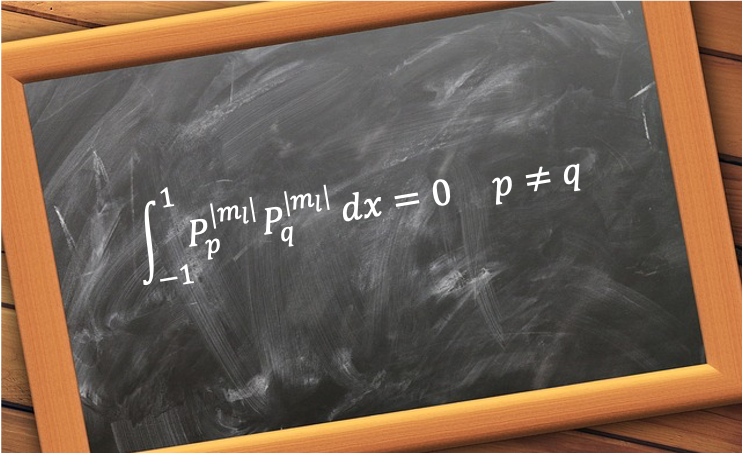The orthogonality of the associated Legendre polynomials states that the integral of the product of two distinct associated Legendre polynomials over a specified interval is zero.

It is defined mathematically as:
The values of (the orbital angular momentum quantum number) differ for the two associated Legendre polynomials, while the values of
(the magnetic quantum number) are the same. This is because the eigenvalue of an associated Legendre polynomial is a function of
.

Question
Why are the limits of integration in eq380 from -1 to 1?
Answer
The associated Legendre polynomials are used to describe spherical harmonics, where and
. Therefore, the orthogonality of the associated Legendre polynomials is analysed within the interval of
.
To prove eq380, we substitute eq364 in the LHS of eq380 to give
where and
.
The proof involves carrying out the integral on the RHS of eq381 by parts times. Let
and
. So
and
.
We begin with the integration of the RHS of eq381 by parts times. The first integration yields
This implies that . Otherwise, the first integration would be the first of
integrations by parts. Since
, the boundary term
equals zero and
Let and
. Then,
and
. Repeating the integration by parts a second time, we have
. Using the same logic mentioned in the first integration,
and the boundary term again vanishes, resulting in
For subsequent integrations, the boundary term includes
, which retains the factor
in each term after carrying out the derivatives. Hence, for
integrations by parts, the boundary term vanishes after each integration, giving
For the first of integrations by parts, let
and
. Then,
and
. We have
Since , the boundary term again vanishes, resulting in
For the second integration by parts till the integration by parts,
, where
. Therefore, the boundary term vanishes each time. The final
integration by parts gives
In other words, for integrations by parts, we have
Using Leibniz’s theorem,
Since is a polynomial of degree
, then
only when
. Similarly,
only when
, or equivalently, when
. These two conditions imply that the only non-zero term in the sum occurs when
and
. Eq382 becomes,
which is equivalent to eq380 when .